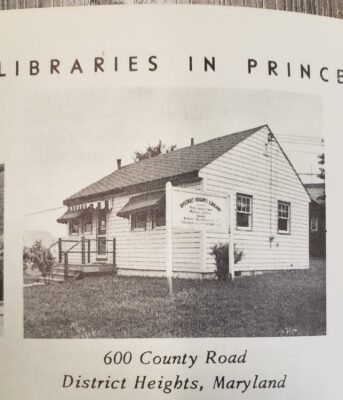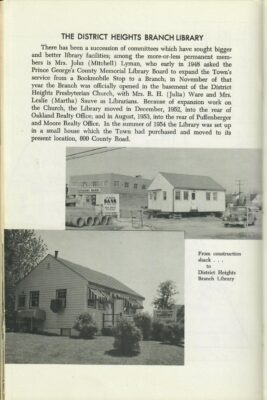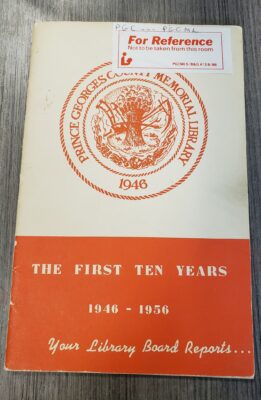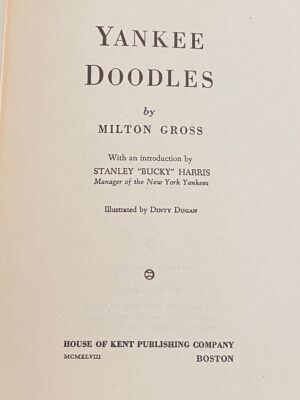I’m in big trouble.
While unpacking boxes from our family’s recent move to our Forever Home, I discovered an overdue library book.
Fifty-six years overdue.
Yankee Doodles by Milton Gross, copyright 1948, was checked out of the local District Heights, MD, library by me on September 28, 1966.
Five-and-a-half decades later, I can’t recall the exact circumstances behind this faux pas. I was 11 years old.
I occasionally came across this book over the years, but life always got in the way and I never got past good intentions. With my voracious appetite for all-things-baseball, I’m sure this wannabe major leaguer checked it out (during President LBJ’s term in office) with good intentions to consume its stories about my heroes and return it before it was due.
Oops?
My lifetime passion for baseball is perhaps only matched by my appetite for reading. Even as a youngster, I loved books, magazines and, a bit farther down the road, newspapers. Early on, I devoured the written word complements principally of my town’s quaint library. Located around the corner from the local elementary school I attended, it was nothing more than a small white cottage, likely a home in a previous life. In those days, kids walked to and from school, and the library was a frequent stop on my way home after I got off my safety patrol post.

District Heights Library County Road
Our District Heights library was a three-room, 468-square-foot wood building located on land donated to the town by the next-door Tudge family. It was opened on July 18, 1954, on Old County Road, where it remained until closing permanently on March 13, 1987, in anticipation of the opening of the Spauldings Branch on Old Silver Hill Road.
The building was originally the construction shack (a small house) at a site near the Citizens Bank on Old Silver Hill Road down from Kay Cee Drugs. The Town purchased the building and moved it to 600 County Road.
Its three small rooms were floor-to-ceiling shelved with adventures, suspense and thrillers, detectives and mysteries, history, romance, fantasies and dreams, sci-fi, biographies and autobiographies, literary fiction, and classics by gifted authors. The entire cube of the structure gave new meaning to the term book nook. The building couldn’t possibly have held 20 people at any one time.

Page from DH’s 25th-anniversary booklet, compliments of Bob Brown, Crofton, MD
Library service in District Heights and other areas of Prince George’s County was initially provided by bookmobile beginning in 1946. Early in 1948, Mrs. John (Mitchell) Lyman asked the Prince George’s County Memorial Library System’s Board of Trustees to expand the town’s service. As a result of that request and the work of a succession of library committees, a branch was opened in the basement of the District Heights Presbyterian Church, which I also attended. This library was the third branch in the county, following Laurel and the Hyattsville City Library, later known as Magruder. It preceded the move to the small white cottage that became an after-school destination for me.
Books were arranged left to right on each shelf, top shelf to bottom shelf. They were, of course, meticulously accounted for by the Dewey Decimal Classification, colloquially known as the Dewey Decimal System, a cataloging structure used in U.S. libraries since the 1870s when Melvil Dewey developed it and attached his name to it. Our small library included an old 6×8 drawer Dewey Decimal System cabinet chock-full of cards, each with two notches at the bottom, typed and filed together in alphabetical order, with separate cards for the author, title and subject.
In my mind’s eye, I can still see the small steel table with a green top with a couple of chairs for folks to sit and peruse their books or magazines of choice or perhaps to accommodate students doing research or working on school projects, including book reports.
Immediately to the right of the library’s front entrance was the cramped but uber-organized environs of the librarian, Mrs. Shirley Brashears. I recall her name because we were buds — I as a respectful young lad and regular visitor, and she as the guardian of the tomes, the Dewey, and the Code of Silence. The latter was strictly enforced by Mrs. Brashears. No matter the conversation, hushed volume control was absolutely required in the modest space. Otherwise, the obligatory “shhh” and “that librarian look” would emanate from the throne. And you didn’t want to be shhh’ed twice.
Mrs. Brashears knew everything, or so it seemed. She didn’t need to use the Dewey because she knew where every book and resource was located; however, I recall that she always took the time with young readers to escort us to the long drawers of the cabinet to teach us how to use the classification system. Then she guided us to the general location of the book we sought and had us find it on the shelves. She was a powerful search engine, but with a heart. She also pretty much knew the names of every resident of our town. Mrs. Brashears was a special person to our community and to me, using her unique skills and passion for connecting people to information looonnng before the world even considered what the definition of digital might turn out to be. She lived the precept that libraries weren’t the destination — they were the transportation to a wealth of knowledge.
 Libraries — whether government, public, academic, special-focus or historic — are treasure troves of information, including corroboration of and lessons learned from history’s greatest and most creative minds. Regardless of fiction or nonfiction genres, books open windows to the world. Their cache of titles has the power to transport bibliophiles of every age to unimagined locales and the riches that come with knowledge.
Libraries — whether government, public, academic, special-focus or historic — are treasure troves of information, including corroboration of and lessons learned from history’s greatest and most creative minds. Regardless of fiction or nonfiction genres, books open windows to the world. Their cache of titles has the power to transport bibliophiles of every age to unimagined locales and the riches that come with knowledge.
But they’re soooo much more. Let me count the ways and perhaps jog some of your own bibliotheca experiences. First of all, access is free. And so is the Wi-Fi. Your local library can pinch-hit as your office. It’s a spot of quiet solitude — one of the few places you can go where folks aren’t constantly on their phones. It is one of the best places to learn the history of your local area. Books aren’t cheap in the retail world, but you can walk out of your local library having borrowed multiple titles on myriad subjects. The children’s section! Some libraries even host free weekly story-time events and all matter of classes. It’s no longer your momma’s library sans computers — they’ve become technology hubs. And unless you’re the odd bird who is anti-reading, perhaps the most unique ingredient is that you are guaranteed to find something on the shelves that inspires you. What’s not to like?
Google? I’m a fan and perpetual user. For a good reason, Google is the reigning and future champ of search; indeed, I’d go so far as to state that the search engine is virtually indispensable. That being said, libraries and librarianship have their own unique chops — check out this article where the author provides 10 reasons why libraries are still better than the Internet.
 But I digress.
But I digress.
I suspect that Mrs. Brashears would not be pleased with my Yankee opus being 20,363 days overdue.
I knew I was likely in rarified air. The Guinness World Record for the highest library book fine ever paid is $345.14 for a book of poetry due 47 years earlier.
I further tapped the googles with the query, “What happens if you never returned a library book?” Here’s the frightening response: “Should an item never be returned and the cost of the item never paid, the Library Gods will assess the amount of time lost by the item from the community. This time will be deducted from the offending patron’s life.” I never really considered this option. Honest. I was just curious.
I took a deep breath and called the Prince George’s County Memorial Library System. Fessing up, expressing remorse, and taking full responsibility, I told my story to the head of the Adult Services Department, concluding with an assurance of my intent to return the wayward book just unearthed from a moving box.
The rep barely suppressed a chuckle when I outlined the duration of time I had the book in my possession. I reflexively knew the reason for the long pause on the other end of the call. I broke the silence by inquiring as to what my fine would be for such an egregious offense. More silence. More heart palpitations. I was informed that the fine for overdue books was, until recently, 25 cents per day. I’d apparently avoid jail time by stroking a check for $5,090.75.

Quote attributed to Plato …
Fortunately, the librarian showed mercy on me. Perhaps she was a Yankees fan. Maybe she heard my passion for my old hometown and the long-gone library of my youth. Whatever the reason, I was told that the fine would be waived if I returned the book, a condition that I gladly accepted to dodge the fine … and do the right thing, of course. She added that the fine system was done away with in July 2020; instead, the “fine” today is the cost to find and purchase the AWOL book for the library’s shelves as a replacement for the original.
Whew!
Before I head to the post office, methinks that I’ll take this weekend to reread the book. It’s been awhile, and I’m sure it’s a good read.
Don’t forget your local library. Granted, there are many ways to connect people to information in these times. If you don’t include your local library as one of your resources, do yourself a favor and set aside an hour for a visit. And get yourself a library card. You’ll be happy you found each other … just like a good book.
*************************************
LSomerbyCooke Addendum …
My sincere thanks to the Prince George’s County Memorial Library System for their historical research tied to the District Height’s library, particularly the Adult Services/Prince George’s Room department of the Hyattsville Branch Library and the Administrative Offices of PGCMLS. When looking for facts to back up my fond memories I, of course, turned to the library gurus, and, as is always the case, they didn’t let me down.
For a quick and fun read, check out this RD.com article titled “11 Crazy Overdue Library Books That Were Finally Returned.”
Finally, the last couple of years have been particularly challenging for libraries and library workers. Despite challenges, libraries have stepped up, continuing to provide critical services and develop innovative programs. Check out the ALA -published State-of-Americas-Libraries Report 2024.


